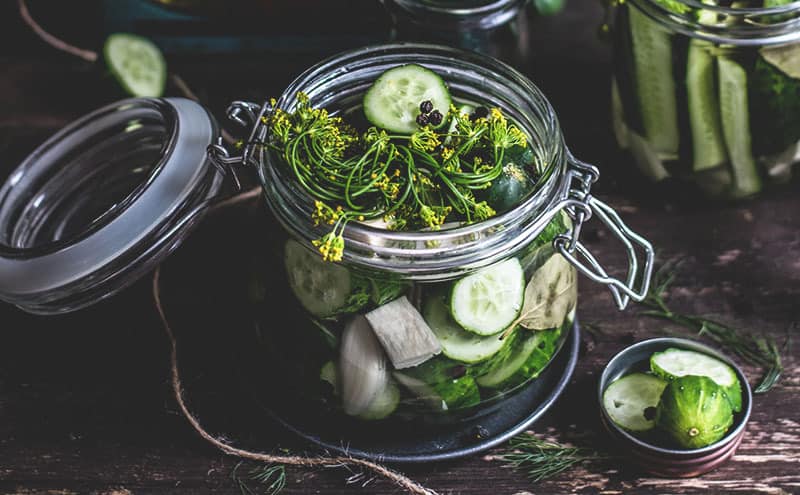
Article at a Glance
- Pickle juice offers a number of potential health benefits and can remedy several ailments
- Pickle juice can help relieve muscle cramps, makes a good hangover cure and can remedy menstrual cramps
- It can benefit sports performance and aid post workout recovery
Dating as far back as the ancient Roman and Egyptian times, pickles have been used for their health benefits. More recently, pickles have moved from being a must have in your pastrami sandwich to a popular food for good health.
In the last few years there have been reports of numerous health benefits associated with drinking pickle juice. We decided to delve deeper into the world of pickle juice and discover what it can really do for your health. Let’s find out is drinking pickle juice good for you?
What Is Pickle Juice?
Pickle juice is the liquid pickles are stored in – whether shop bought or home-made. Cucumbers are the vegetables most commonly pickled, although other vegetables can also be pickled and are increasing in popularity.
Pickle juice is primarily made up of salt and water and vinegar. This provides good conditions for the naturally occurring Lactobacillus bacteria on the skin of the cucumbers to ferment over several weeks.
Pickle juice contains the electrolyte minerals calcium, sodium, potassium as well as magnesium and health-boosting probiotic bacteria, although some manufacturers remove the bacteria as part of their production process. Pickle juice contains a tiny amount of carbohydrates, so it is suitable for those following a low carb eating plan.
Why Drink Pickle Juice?
It has been reported that pickle juice can enhance sports performance and recovery, is effective against muscle cramps (including menstrual cramps), can reduce stomach pain, cure hangovers, soothe sunburn, boost the immune system and digestion and help to control blood sugar levels. Some of these claims are supported by scientific research. Others are at best only supported by anecdotal evidence.
Pickle Juice for Sports Performance
The theory behind why pickle juice is thought to be beneficial in terms of sports performance is linked to the electrolytes provided by pickle juice. So let’s get a tiny little bit technical about how muscles work.
The first thing that needs to happen for a muscle to contract is it needs to be stimulated by the nervous system. An electrical signal – a nerve impulse – is generated in the main body of the nerve. This impulse is carried all the way along the nerve fiber by a wave of electrolyte exchange.
When the impulse reaches the junction, it shares with the muscle, the shift in electrolyte balance causes chemicals to be released which in turn stimulate the muscle to contract. It’s amazing to think this is happening inside all of us millions of times every day.
In terms of sports performance, we clearly need a ready supply of electrolytes for our muscles to perform optimally, and pickle juice is a great source of the electrolytes required. However, research suggests that consuming pickle juice before exercise actually has no beneficial effect on sports performance. (source)
In actual fact, this isn’t so surprising – our bodies are generally very good at getting us primed and ready for anything, so it makes sense that the nervous system is already loaded with the electrolytes it needs.
Pickle Juice for Post-Exercise Recovery
Pickle juice has also been reported to aid recovery after working out, the theory being that it replaces the electrolytes used. In research trials, this doesn’t seem to be the case.
Some research has shown that consuming a small amount of pickle juice (1 ml per kg of body mass) does replace some of the electrolytes, but does not fully replenish them. Most of the studies in this area acknowledge the need for further investigation. (source)
Pickle Juice Helps Muscle Cramps
Muscle cramps can occur for a variety of reasons, including overusing or straining a muscle, holding a muscle in one position for an extended period of time, poor blood supply, nerve compression, insufficient electrolytes or dehydration.
In some cases, the cause of muscle cramps isn’t fully understood.
Whatever the cause, muscle cramps can be troublesome and painful. Research has shown that drinking as little as 1 ml of pickle juice per kg of body mass can stop muscle cramps as quickly as two minutes after consumption.
In the research trials, recovery from muscle cramps after drinking pickle juice was more than 35% faster when compared with drinking water, and 45% faster than drinking no liquid. (source)
Pickle Juice and Menstrual Cramps
Although there is no hard scientific evidence to back this claim, it may be that pickle juice can help to relieve menstrual cramps in the same way that it has been proven to help other kinds of muscle cramps.
Pickle Juice and Stomach Pain
Anecdotal evidence may suggest that consuming pickle juice helps to relieve stomach pain, but there seems to be little research to support this. Vinegar, an ingredient of pickle juice has been shown to inhibit the growth of many different types of bacteria, but research trials have been unable to prove that vinegar is more effective than stomach acid.
Although there is no hard scientific evidence to substantiate claims that pickle juice relieves stomach pain, there is no harm in giving it a try unless you have a gastric ulcer, in which case pickle juice should be avoided.
Pickle Juice and the Immune System
Many people believe that pickle juice boosts the immune system and helps our bodies to fight disease. Certainly, research has proven that vinegar can wipe out an impressive 95 per cent of virus present in food, proving that vinegar is an effective natural way to preserve food and decrease health risks. (source)
Pickle Juice Helps Control Blood Sugar
The amount of glucose in the blood and the glucose stored in the body all originates from carbohydrate food sources.
Poorly controlled blood sugar levels can lead to developing type 2 diabetes, and people who already diagnosed with diabetes risk developing ulcers, eyesight and kidney problems, nerve disease and heart disease.
Scientific studies have shown that pickle juice is effective in reducing blood sugar levels. This can help you avoid developing diabetes and assist people with diabetes in better managing their blood sugar levels. (source)
Pickle Juice as a Hangover Cure
The unpleasant after effects of alcohol are mainly caused by the dehydrating effects of ethanol. Typical symptoms include headache, dry mouth, fatigue sweating, nausea and sometimes vomiting and dizziness.
Although there does not appear to be any scientific evidence that pickle juice directly cures a hangover, studies have shown that drinking pickle juice encourages an increase in the consumption of water.
This is thought to be due to the sodium content of pickle juice, and increased water consumption is most certainly desirable in dealing with a hangover.
So although science doesn’t give us a definite answer to this use for pickle juice, it may be worth a try after the next office Christmas party.
Pickle Juice as a Sunburn Remedy
Thankfully, most people are now much more aware of the dangers of getting too much sun. Even so, on the first day of your vacation in a climate you’re not used too, it’s still easy to overdo the sunbathing.
Skin redness, pain and, in more severe cases, swelling, skin blistering and peeling, nausea, fever, headache and fatigue are all unpleasant symptoms of sunburn.
Anecdotal evidence suggest pickle juice can be applied directly to the skin to reduce sunburn symptoms. However, there are currently no scientific studies to support this.
It may be that because pickles are generally stored in the refrigerator, the coolness of the liquid help to create a soothing effect. In addition, perhaps the vinegar in pickle juice helps to protect any broken skin from bacterial infection, but again, there’s no hard evidence to support this.
When Pickle Juice Is Not a Good Idea
Although pickle juice may have some positive effects on health, there are some circumstances where it can have a negative effect.
The high sodium content in pickle juice means you should at least take medical advice if you have a history of high blood pressure, and it’s good to be aware that too much sodium in your diet can lead to bloating and water retention.
If you’ve decided to include pickle juice in your diet and subsequently notice these symptoms, discontinue drinking pickle juice and seek medical advice.
Pickle juice is an acidic liquid, making it unsuitable for people with stomach ulcers or a history of gout. Too much pickle juice, especially when consumed in one sitting, can lead to symptoms like indigestion, gas, stomach pain and diarrhea.
When introducing pickle juice into your diet, it’s best to start with small amounts and build up to your desired amount gradually.
Is Drinking Pickle Juice Good for You? Final Thoughts
Pickle juice does have some health benefits that are supported by modern scientific evidence. Its effect on muscle cramps in clinical trials is highly impressive, and it has been shown to significantly reduce blood sugar levels.
As for the rest of the claims regarding the health benefits of pickle juice, there isn’t as yet any evidence that it works – it most definitely is not a panacea.
However in most cases drinking pickle juice won’t do any harm, and is perhaps worth a try.

Leave a comment